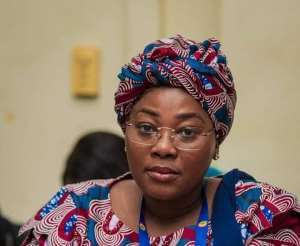
Member of Parliament for Savelugu in the Northern region, Hajia Fatahiya Abdul Aziz has raised some red flags about the recently launched Free Sanitary Pads initiative by President John Dramani Mahama aimed at keeping the girl-child in school.
According to her, the intention behind the initiative was good but cautioned that the implementation of the policy may pave the way for what she described as “bitter disappointment” if not carefully implemented.
“The Intentions behind this policy are noble. No girl should be forced to miss school or resort to rags, leaves, or bits of mattress foam during her period. But good intentions, without careful execution, often pave the way to bitter disappointment. Unless urgent corrections are made, this initiative risks becoming a national symbol of mismanagement, lost opportunity, and broken promises”, she said.
The Savelugu lawmaker who is also the Deputy Ranking Member on the Gender, Children and Social Welfare Committee of Parliament gave the caution in an article she wrote on the subject matter.
She proposed a targeted approach to the initiative by first tackling the five regions in northern Ghana, which are mostly deprived and poverty stricken whilst providing improved places of convenience in the various schools across the country to help achieve the objectives of the initiatives.
The MP noted that while the unveiling marks a significant policy shift and positions Ghana among countries that have prioritized menstrual equity, the program faces serious scrutiny over its planning, execution, and sustainability.
Speaking from a dual vantage point as a woman, mother and lawmaker, Hajia Fatahiya Abdul Aziz expressed not celebration but anxiety. “My heart should be brimming with pride,” she noted, “Instead, it aches with worry.”
The MP said, her concerns are rooted in the poor planning and misaligned priorities of government on the initiative.
The government has budgeted GH¢292.4 million to serve two million girls, roughly GH¢146 per student annually. However, with quality sanitary pads costing GH¢15 to GH¢40 per month, simple calculations reveal a troubling funding gap. “Is this a genuine intervention,” she questioned, “or a political gimmick dressed in the cloth of compassion?”
Another concern of the legislator is the geographic inequity, stating that Girls in Ghana’s five northern regions, where poverty levels are highest remain underserved.
This uneven rollout she said raises doubts about the program’s commitment to equity and inclusion and observed that girls in rural districts like Zebilla and Bunkpurugu continue to wait for their turn.
The MP also mentioned infrastructure challenge in schools as a major challenge to the initiative. According to a 2024 report by SEND Ghana, 63% of basic schools lack access to adequate toilet and hygiene facilities.
Without proper water, sanitation, and hygiene (WASH) infrastructure, merely handing out pads can be counterproductive exposing girls to embarrassment and risk, rather than delivering empowerment.
Concerns such as delayed supply deliveries, substandard product quality, corruption in procurement and distribution, a model that promotes dependency rather than long-term resilience and sustainable financing framework for the project were raised by the MP.
Abdul Aziz urged government to prioritize local production by reviving the cotton industry and establishing pad manufacturing hubs in regions like Tumu and Tamale, offer tax exemptions on sanitary products, and target the most vulnerable girls through data-backed strategies.
Other recommendations includes improving school infrastructure, investment in gender-friendly toilets with water and disposal facilities by 2026 to avoid rendering the sanitary pad initiative a hollow gesture.
She further proposed dedicating 1% of VAT revenue to menstrual health, using blockchain technology to ensure transparency in procurement and distribution, and publishing real-time performance reports to foster public trust.
The Savelugu MP appealed to President John Mahama, to ensure a detailed, costed implementation plan with pilot phases of the project launched in the northern regions before any national rollout.
She also urged the need for civil society, traditional leaders, and local assemblies, participation as active collaborators in the process.
The MP encouraged all Ghanaians to demand accountability, support local manufacturing, and to confront the stigma that continues to surround menstruation.
“This initiative is bold, visionary, and filled with hope,” she concluded. “But hope alone is not enough. Our girls deserve more than promises.They deserve dignity. Not just pads, but protection. Not just applause, but action”, she said.


